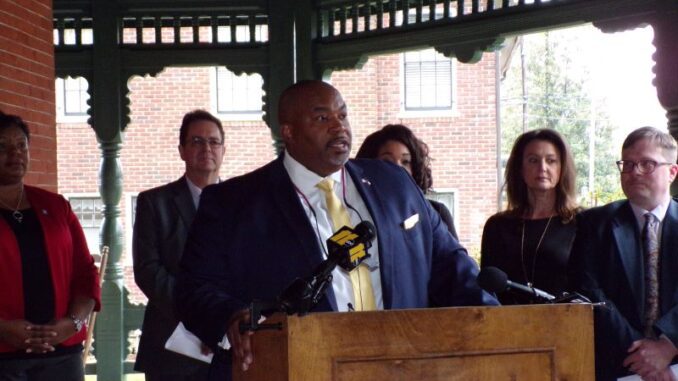
 Lt. Gov. Mark Robinson may be the most unique political officer ever elected in North Carolina history.
Lt. Gov. Mark Robinson may be the most unique political officer ever elected in North Carolina history.
Not only is he the first person of African-American descent, male or female, to be elected lieutenant governor in North Carolina history, he may be the embodiment of the idealized notion of the “citizen-politician” as envisioned by philosophers such as Aristotle, Cicero and the founders of the American Democratic Republic in 1776.
Citizen-politicians are citizens who work hard and tend to their own business and family. They don’t maneuver, posture and finagle their way to get into position to run for political office. When they see a need arise in public policy, they offer themselves up for public service. Once elected, they do the job they were elected to do, as former military general Cincinnatus did when he came out of retirement to save the Roman Empire. They voluntarily resign to go back to their private life, business and family and relinquish all political power because they know the future of the country does not depend solely on them.
George Washington emulated Cincinnatus when he declined to run for a third term as president in 1796. King George III didn’t believe American artist Benjamin West when told of Washington’s intent, but said: “If he does that, he will be the greatest man in the world.”
Even royalty recognizes the virtue of true citizen-politician leadership.
It must seem odd to the casual observer of North Carolina politics that the first black citizen elected lieutenant governor was not a Democrat after 155 years. The proponents of critical race theory must have melted down when Robinson won last November with over 93% of his vote total coming from non-black voters.
Lt. Gov. Robinson was born in Greensboro, the ninth of 10 children in a family headed by an abusive father. He and his siblings lived in different foster homes before being reunited with their family. He graduated from Grimsley High Schools and served in the U.S. Army Reserve from 1985 to 1989.
When he left the service, he got a job in a furniture factory in High Point and started to raise his family. He satisfied his love of history by taking classes at UNC-Greensboro, but reading about politics was as close to “real” politics as he ever got.
One day, a friend gave him one of Rush Limbaugh’s books and asked him to read it. Over many conversations and debates and years of listening to Limbaugh and reading on his own, he developed a political philosophy of his own, as anyone of any race, creed or religion should in America.
Robinson started attending Greensboro City Council meetings to learn more about local issues. He never said anything during any of them, until one night in April 2018, when the council was debating canceling a gun show in the wake of a recent high school shooting.
Mr. Robinson did not own a firearm at the time. He was not a card-carrying member of the NRA. He had no agenda concocted by a political operative to make himself famous that night in Greensboro. He had never spoken in public before outside of a church.
He did not even have a prepared speech or notes. He spoke from the heart.
Something inside of him made him stand up to give an impassioned speech for freedom and adhering to the Constitution, based on principle and personal philosophy, not politics.
Then 15 million people saw it on YouTube.
Two years later, in May of 2020, Mark Robinson soundly defeated eight other Republican candidates and won the GOP nomination to run for lieutenant governor. He went on to beat the Democratic nominee by over 170,000 votes in the General Election when President Trump won the state by less than 75,000 votes.
The left says they want more diversity in everything. Well, it is hard to get more diverse than being a conservative African-American lieutenant governor who is a Republican in the state of North Carolina, isn’t it?
Whatever drove Mark Robinson to speak at the Greensboro City Council meeting was distinctly American in nature. People say they are tired of professional politicians who never get anything done.
Citizen-politicians such as Lt. Gov. Mark Robinson might be the answer.



